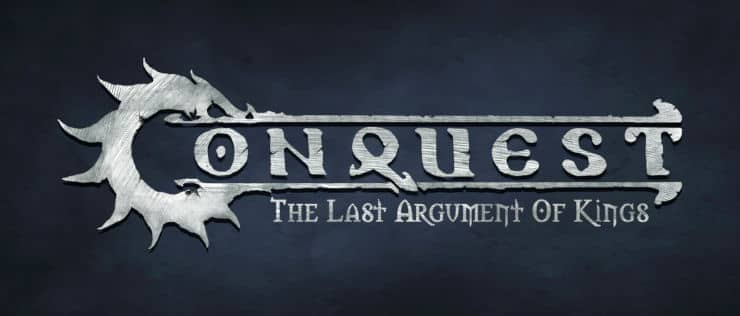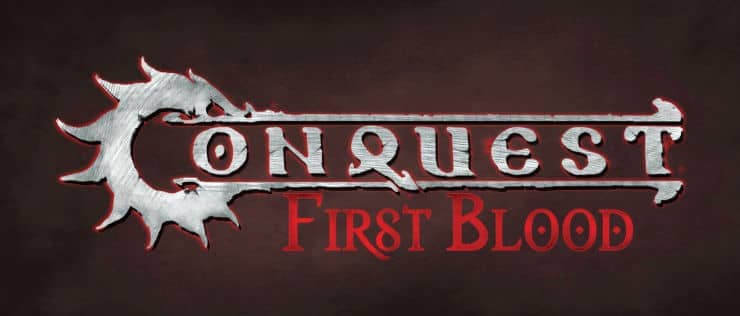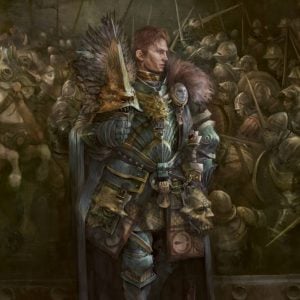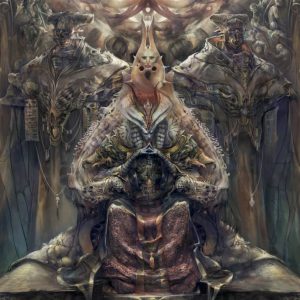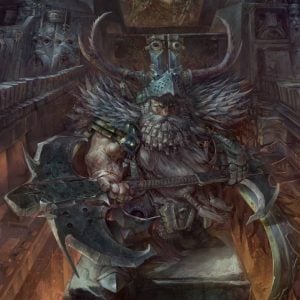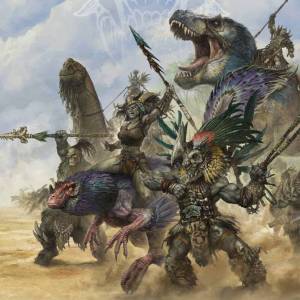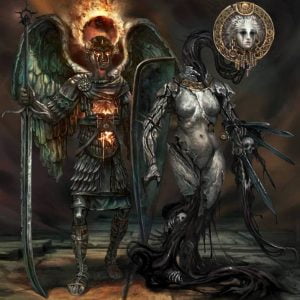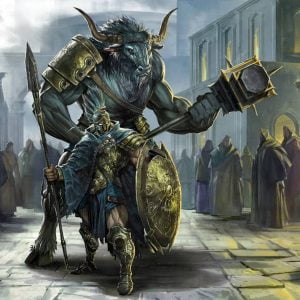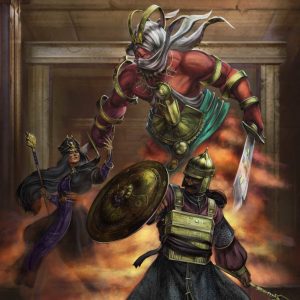
When most denizens of the Hundred Kingdoms think of the Nords, certain – perhaps stereotypical – traits come to mind. Raiders, drunkards, barbarians, savages, heathens, and other such flowery traits are attributed to the denizens of Manheim. Yet, despite the somewhat warranted infamy – as Nord raiding parties are numerous and quite unpleasant to deal with – there is one aspect of these northbound people that often goes unrecognized: exploration. For all intents and purposes, the Nords are inherently free spirited and adventure-driven, completing ever more daring deeds to fuel their illustrious sagas. Such a mindset, along with unparallel seafaring skills, makes for tenacious and fearless explorers – with some of the culture’s most famous voyages bordering on the realm of myth due to their sheer scale.
One cannot approach the subject of Nord explorers without mentioning the figure that acted as the source of inspiration for many would-be adventurers – Hjul the Fisherman. Hjul’s story famously fuels the holiday of the Night of the Burning Tree; it is a tale of hope and sacrifice both, for those walk hand in hand for the Nords. And yet the tale’s many iterations inspired more than a tradition for the longest night of the year, and for many the brave fisherman sailed beyond the edge of all known things, becoming a star to guide sailors. Harald Giantsbane was one of the many souls that lusted to find the star-sea of Hjul for himself, wishing to sail his vessel beyond the end of all realms.
Before the last act of his story played out, Harald Giantsbane was a warrior of great renown, conducting many successful raids against the milk-blooded denizens of the south. Tales tell of Harald’s inhuman strength, with some claiming that the Nord warlord once arm-wrestled a mountain giant and won – shaming the humiliated titan to the point of self-exile. So many were Harald’s victories in combat, that his cape was made from the severed beards of his defeated foes, leaving no room for anyone to doubt his might. One fateful night, bloated with mead and at the presence of the High King’s court, the Giantsbane made a promise that would alter his legacy forever – he would find the world’s edge and empty his bladder from the precipice of eternity. To fulfill his pledge, Harald gathered a fleet of twenty ships and, dismissing the notion of Hjul sailing south, he set sail northwards.
Harald’s famed fleet was gone for two winters – until a single ship returned to Manheim on the eve of the third. Aboard were a scant few of the Giantsbane’s men, along with Harald himself. The great warrior – whose extremities had fallen off from frostbite – was now a raving lunatic. He and his men spoke of a great wall of ice; of titanic monsters that lurked beneath the frigid sea; of savage, white-furred beasts that walked on two legs; and of unrelenting winds that flayed flesh down to the bone. Considering the state of the remaining crew’s sanity, many saw their tales as maddened ravings. Despite the unreliability of Harald’s accounts, henceforth known as the Mad, the denizens of Manheim found one common point of agreement from his tale – sailing into the far-flung north is folly of the highest caliber and will only bring about disaster.
Many winters after Harald’s doomed expedition, another explorer sought to find the world’s famed end – Inga Magnadottir. Inga, a Volva’s chosen who had forsaken her calling for a life of plunder and adventure, thought to sail westwards for her mission – arguing that the world is a flat circle, and that she could reach the edge by following the tamer western sea currents. Departing with a modest five ships, so as to not be hampered by numbers, as was the case with Harald, Inga was gone for three full winters – shocking everyone when she once again reached Manheim from the east! Magnadottir’s arrival came with some truly groundbreaking claims – with many Nords denouncing her and stating that she was madder than Harald. Inga declared that there was no end to the world to sail beyond, but that the world went on until it brought you back. She spoke of faraway continents and islands which housed nations, eternally locked in conflict; she spoke of horrors that lived beneath the waves, and of a land broken in two, as if the world serpent itself was wounded there. While Inga’s tales are widely dismissed as the product of madness, the seed of speculation has blossomed within many still – with some brave souls wishing to replicate the same perilous journey and uncover the truth for themselves.
Yet, of all the explorers to grace the many sagas of the Nords, none are as famous – or infamous – as Ulric Thorketill, who simply came to be known as Ulric the Unlucky. Ulric, like many of his kinsmen, craved for adventure and the boasting rights that accompany it, showing notable skill as a warrior from a young age. Accompanied by a natural affinity for persuasion and storytelling, Thorketill managed to gather a sizeable following before departing for his first recorded escapade. His target was the coast of Braeonia, where the Nord leader terrorized its poorly defended fishing hamlets and villages; that, though, quickly proved to be a boresome activity. While attacking a small, unguarded settlement, Ulric managed to capture the local wisewoman, who carried with her many secrets and morsels of forgotten lore. The witch, in an effort to save her people, bargained with the warband leader – offering to disclose the location of a hidden druidic village in return. The settlement, the woman said, was nestled deep within the forests of Braeonia and housed invaluable treasures within it; she assured the Nord captain that it had but a few scant warriors, offering bleak resistance to the manpower of his warband. Ulric, delighted with the idea of true adventure, left a token garrison of men at the conquered settlement and made his way to the secretive location – guided by the veiled forest paths that the wisewoman showed him. Alas, misfortune struck upon arrival to the secret village: the inhabitants, while few in number, managed to kill everyone but Ulric himself, who made it back to his few remaining men at the coast. Sailing back to Manheim, the terrified Nord spoke of forest-dwelling superhuman warriors, who gained unnatural strength by drinking a specially brewed potion. The strongest amongst them, claimed Ulric, was a large, fat-ladened bear of a man, who could hurl a warrior with a single flick of his finger. Almost everyone considered Ulric a liar, believing that he was trying to hide a shameful defeat by the pathetic southlanders.
The most famous and final of Thorketill’s many escapades – with all of them ending in failure, under outlandish circumstances, and with Ulric as the sole survivor – was his search for Surtr’s birthplace. Once again, the Nord’s silver tongue garnered him a sizeable warband, promising treasures untold to those that would follow him into the extinguished empire of the Fire Children – Surtr’s fallen Dominion. The northmen travelled south and faced the east, reaching lands with ash-clogged skies and the bitter touch of Fimbulwinter still lingering within them. It is said that Ulric managed to reach Surtr’s mythical birthplace, the First City that gave him form, but no treasure was to be found – only cryptic knowledge and lore that the Nords had no use for. Empty-handed, worn-out, disease-riddled, malnourished, and preyed upon by unnatural horrors, the warband made its way back towards the coast, taking what they could from the few locals that still inhabited this diseased region of the world. Tired of Ulric’s false promises and machinations – as the captain began devising a new journey, for when they reached the sea – the story concludes with Thorketill’s men betraying and killing him, slicing open his back and spreading his ribs out like wings. Ulric’s saga ends with his body being quartered and buried in the Dying Lands of the east-facing south, so that his cursed unluck might not burden anyone else again. Yet, Ulric’s legacy survives through his salvaged journal – with many believing his writings to be self-indulgent boasts or fabricated entirely – cataloguing tall tales of superhuman villagers, mythical lost cities, and feats that best represent the Nords’ obsession with adventuring and exploration.

